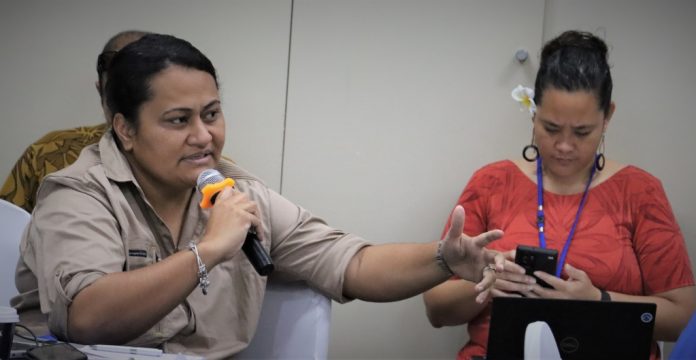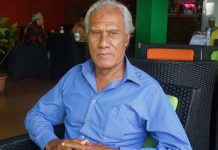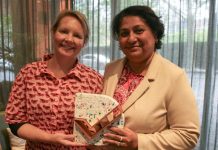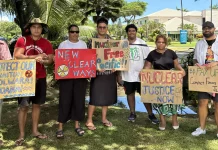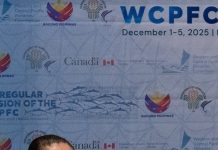The need to build new a structured engagement mechanism and pursue new approaches to strengthen collaboration between providers and users of climate information, is one of the outcomes of the joint meeting of the National Meteorological and Hydrological Services (NMHSs) and National Disaster Management Offices (NDMOs) in the Pacific.
The two-day meeting in Nadi, Fiji from 10-11 August 2023, is a key steppingstone in the work by NMHs and NDMOs to co-develop a regional User-Interface Platform (UIP) for the Disaster Risk Reduction (DRR) sector. Considered a key pillar under the Global Framework for Climate Services (GFCS) and the Pacific Roadmap for Strengthened Climate Services (PRSCS), the UIP aims to promote the collective development, delivery, and utilisation of climate information to improve prevention, preparedness, and response to disasters and extreme climate events.
The Director of Fiji National Disaster Management Office, Vasiti Soko, said the opportunity to bring the NMHS and NDMO communities together was invaluable. “There needs to be ongoing interaction between the two communities to discuss what’s working and what’s not working and that would be my key takeaway from all this,” she said. “We need to continue to create and enable this space where these two groups can speak and engage freely about successes and the challenges. There is a need for a platform and a space for the two communities to talk about the issues they are facing.”
In Fiji, Soko said they have undertaken a lot of work to collaborate nationally but there is a need to take that next step where they can gather with counterparts from other regions to share stories and experiences. “When we do this, we will find that some of the areas we may lack in could be an area our counterparts are doing very well in, and we can all benefit from this exchange.”
The Director of the Republic of Marshall Islands (RMI) National Weather Office, Reginald White, agrees. “This collaboration is very important,” he said. “There has been a lot of talk during the past two days that this relationship is synonymous to a marriage. In a marriage there is the celebratory beginning but for the marriage to progress well, it takes a lot of work and a lot of attention throughout the relationship.”
In the Marshall Islands, White said this is an ongoing commitment. “Cultivating the relationship between the NHMS and NDMOS wasn’t always easy but we continued to work at it and we made sure we have systems in place so we have that periodical meeting to check on our processes and procedures to make sure we are on the same page.
“At the end of the day, it’s about making sure we are relaying accurate information and then having it disseminated to our communities. Our collective job is to protect lives so politics, relationships, disagreements and fights aside, our one common goal is to save that one life. That’s why we are all here.”
The NMHSs and NDMOs meeting precedes the sixth Meeting of the Pacific Meteorological Council (PMC-6), the first Development Partners and Donors Engagement Meeting (DPDEM-1) and the third Pacific Ministerial Meeting on Meteorology (PMMM-3) from 14 – 18 August 2023 at Denarau, Fiji. The meetings, which are all interlinked, is guided by the theme: “Sustaining Weather, Climate, Water and Ocean Services for a Resilient Blue Pacific.”
The outcome of the joint NMHSs and NDMOs meeting will be presented to the PMC-6.
The Director of Palau’s Meteorological Service, Ms Dilwei Maria Ngemaes, welcomes the outcome of the meeting but said sustainability is something the participants must consider seriously.
“We’ve heard many wonderful presentations but for Palau, I think sustainability is very important for us, we don’t want the work being done to phase out when projects end so we want to ensure that the work continues between NHMSs and NDMOs to benefit our people,” she said. “For Palau, the cooperation and coordination between our Met Services and are very well established ever since we had our National Disaster Framework. I think it is a very important relationship we must continue to develop and improve. After all the safety of our people is our priority.”
The Director of the Papua New Guinea (PNG) National Weather Service, Jimmy Gomoga, said there was a lot to think about from the discussions but this has provided the foundation for further collaboration.
“Sharing ideas, seeing what is working and what is not working is a practice that should always be encouraged and I feel that for PNG, this was a very important gathering,” he said. “There is a lot to think about to make this work and that’s why it’s important we are all in one room, bringing all these parties together to have these conversations.
“It’s not only for the Met side and all the agencies involved, but it also reduces the operational costs so once we have geohazards, hydrology and national met services in one place, it greatly reduces the operational costs. This is one of the biggest takeaways for me.”
The meeting was supported through the European-Union funded Intra-ACP Climate Services and Related Application (ClimSA) project by the Secretariat of the Pacific Regional Environment Programme (SPREP), the United Nations Disaster Risk Reduction (UNDRR), and the Climate and Oceans Support Program for the Pacific (COSPPac). Additionally, support was provided by the World Meteorological Organisation (WMO), the Pacific Community (SPC), the Pacific Regional Climate Center-Network, and other partnering organisations.
SPREP’s Director of Climate Change Resilience, Tagaloa Cooper, expressed SPREP‘s gratitude to all the donor partners.
She concluded: “Having listened to all the discussions from the past two days, it is very clear that everyone wants to go the same direction. You have all shared your experiences and offered valuable contribution to the work to develop a new interface mechanism to continue to save lives and protect the livelihoods of Pacific communities everywhere, both now and in the future.
SOURCE: SPREP/PACNEWS






